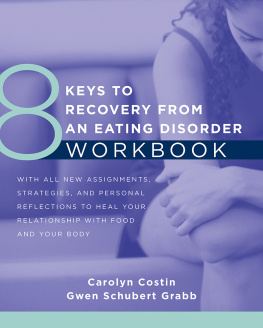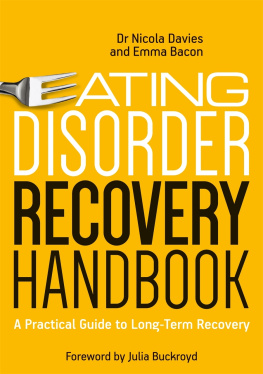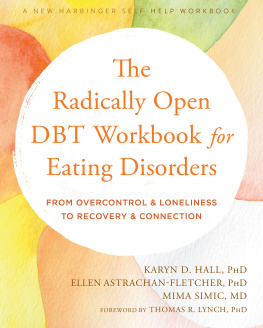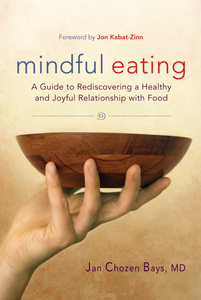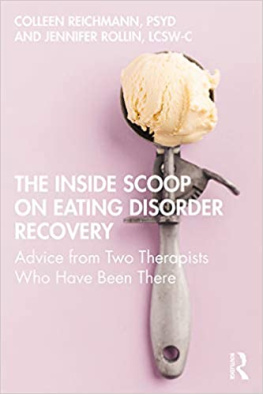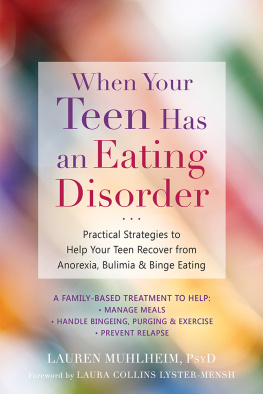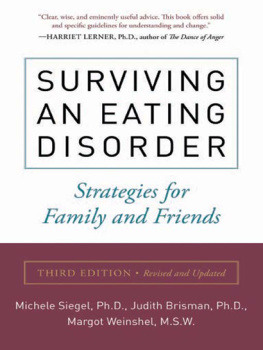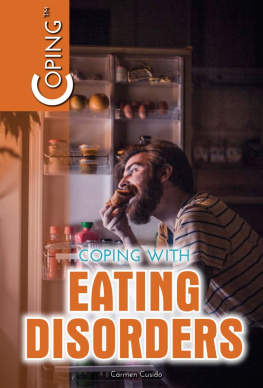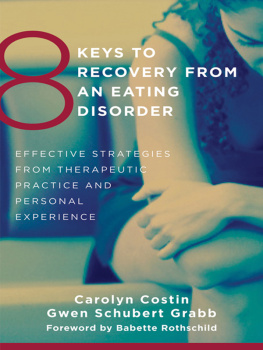

This e-book contains some places that ask the reader to fill in questions or comments. Please keep pen and paper handy as you read this e-book so that you can complete the exercises within.
To all beings who struggle with:
accepting what is,
loving themselves completely
seeking happiness through internal vs. external means
or recognizing their true soul self...
This book is from all my teachers, through me, to you
With love from yourself
Carolyn Costin
For these mothers in my lifemy mother, Lynn, who always
loved me unconditionally and taught me the power of words
and writing in the delicate fusion between emotion and reality;
and to Carolyn, who taught me the power of authenticity
and saved my soul then, and again.
With gratitude and love, Gwen
The feedback on our book, 8 Keys To Recovery From An Eating Disorder, has been phenomenal. Eating disorder sufferers and their families from around the world have thanked us for the book, and especially for the inspiring message of hope that they or their loved one can be fully recovered.
We hear from readers going through the book alone as well as those who use the book with their therapists, in therapy groups, at treatment centers, and even with family members who offer support. Therapists, dietitians, and other professionals write us too, saying they love the book because in addition to the useful information and assignments, it provides them with a comprehensive and structured way to guide clients through the complex and difficult process of recovery. We are grateful for all the feedback and for the opportunity to expand the 8 Keys book by providing a second edition with new material and a workbook format.
The Workbook
Last year Norton asked us if we would write a companion workbook to go along with the original manuscript, reviewing the 8 Keys while giving additional information, exercises, and assignments with space to write directly in the workbook itself. The result is a balance between the original book and new material, such that this workbook can serve as a companion to the original book or can be used on its own. The original book has more detailed information about each Key and different assignments, quotes, and personal reflections, so if you do not have it you might consider getting it, but its not necessary.
You dont need to have a formal eating disorder diagnosis to benefit from this workbook. If you restrict, binge, purge, excessively diet, are a scale addict, or engage in any self-defeating or destructive food- or weight-related behaviors, this workbook can help you. As you read through these pages, you will be looking at your situation with food and your body in a new way. The assignments will guide you in exploring your thoughts, feelings, and coping strategies and help you change your behaviors and heal.
HOW TO BEST USE THIS WORKBOOK
No matter how you came to this workbook, it will help you develop insight and awareness into yourself, your relationship with food, and your relationship to people and life. Simply opening it up suggests at least some small part of you wants something to be different in your life, and that is enough to get started.
Everyones journey of healing and recovery is unique. Likewise, there are many ways to approach this workbook. This is your workbook. You can choose the pace at which you go through this material, deciding what assignments to do and how long you spend on them. The workbook format makes it easy to do the assignments and share them with a professional or any other support person of your choosing. The more you feel in control of this process, the more beneficial it will be for you. That does not mean you wouldnt benefit from a nudge or boost from time to time.
In an effort to simulate, even a tiny bit, what it is like to be in therapy with us, the tone is of us talking directly to you and providing you with the information, exercises, Goal Sheets, and Food Journals we give our clients. We share things from and about other clients and ourselves. And occasionally we offer a tip or idea to help you with a particular assignment.
From the feedback we received on the original 8 Keys, we believe this workbook will facilitate your journey to recovery, whether you are just starting out on the path or find yourself stuck somewhere along the way.
SELF-HELP VS. PROFESSIONAL HELP
Although the 8 Keys books are considered self-help books, we know from our personal and professional experience that recovery is hard and doing it alone much harderand can be too hard for some. A book cannot replace therapeutic, medical, or psychiatric care. If you have an eating disorder, we recommend you get professional help from a treatment team experienced in treating eating disorders. The team may consist of a therapist, doctor, dietitian, and psychiatrist. At the same time, we know there are many reasons (financial, geographical, practical) that make it difficult for many people to get adequate professional help. You might also feel you are not ready for that kind of help, or dont need it. The workbook might help you clarify what you can do.
Hopefully you already have professional help or support of some kind, and if not, as you read though the book, we hope you find the resources or motivation to seek out whatever help is appropriate for you. If you have a therapist whom you feel comfortable with, but who isnt trained in treating eating disorders, using this book can be a helpful guide for both of you.
GETTING PERSONAL
Throughout the workbook you will read personal accounts from others, including us. Everyone who contributed to this workbook has suffered from an eating disorder and is either recovered or working on that goal. We know from our own recovery, our years of experience treating others, and from research, how helpful and important it is to hear from and connect to others who have recovered. Clients consistently tell us that knowing we were recovered was one of the most helpful aspects of their treatment. Our own personal reflections are shared exactly as they occurred, but some quotes from clients have a few details changed to ensure confidentiality. In the original 8 Keys book, both of us share aspects of our personal stories from our illness to being recovered, giving readers a glimpse into the process of treatment from both sides of the couch. Twenty years ago, Gwen was a client at Monte Nido Treatment Center when it first opened in 1996. Carolyn, who is the Founder of Monte Nido, was also a therapist and the clinical director at that time. If you have resistance or fears about going into a treatment facility, or have been discouraged or afraid to seek professional help, reading our personal reflections in the original 8 Keys book and the information we include here might help you feel differently. In this workbook, we continue to share our own reflections and how we personally apply the concepts we teach. In the past few years since the original book was published, both of us experienced significant losses and life events that were challenging. Thankfully, being recovered, we know how to deal with the painful and difficult aspects of life in a healthy way. We continue to work at balancing our lives, accepting who we are, and keeping our traits working for us instead of against us, all of which this workbook is meant to help you do as well.
THE ASSIGNMENTS
As you read through each key, we prompt you to do assignments. Many people struggle over doing the assignments and ask us if they are really necessary. As strange and time-consuming as the assignments might seem, there is no doubt in our minds that the people who take the time to do them will be able to absorb and utilize the material much better than those who just read the book. When, or in what order, you do them is not important, nor is doing them right away. You might be ready and dive into the assignments, complete every exercise, and share your progress with a trusted friend or therapist. On the other hand, you might read through the workbook before you decide to complete a single exercise. Either approachor any approach in betweenis fine. We usually have clients do the assignments during the week and bring them in to sessions to discuss. If you want support, and to connect with other readers, we created a Facebook page called 8 Keys to Recovery From an Eating Disorder Group so our readers can post their experiences, ask questions, and share ideas.
Next page
